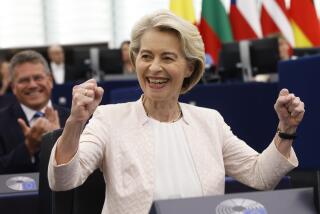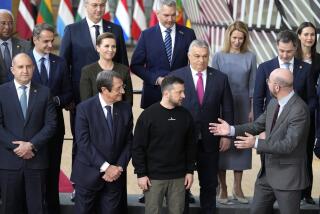EU Settles Fight Over Jobs, Keeps Euro on Track
- Share via
AMSTERDAM — European Union leaders pledged Monday to do more to create jobs for their 18 million unemployed, defusing a sudden crisis between France and Germany that had endangered further European integration and vaulting a last-minute hurdle on the path to a common currency.
“The light is green for progress in preparing for monetary union by 1999,” a visibly delighted Dutch Prime Minister Wim Kok, the summit’s host, announced at a news conference.
The accord allows the 15 European leaders to focus on the original agenda of their two-day meeting in this canal-laced city of northern Europe: reforming the union’s rules and procedures to make way for a new wave of members from the former Soviet Bloc nations of Eastern Europe.
The jobs issue had rocketed to the top of Europe’s priorities with the election this month of a left-wing coalition government in France, whose 12.8% unemployment rate is the highest among leading industrialized nations.
“We have started to reverse a trend. We have loosened the noose,” said the spokesman for new French Prime Minister Lionel Jospin.
Jospin had tied his support for the euro, the planned single European currency scheduled for launch Jan. 1, 1999, to new measures to kick-start economic growth and generate employment.
Jospin objected especially to a stability pact, agreed to at the European Union’s last summit in Dublin, Ireland, in December, that would slap fiscal constraints on nations allowed to use the euro--to guarantee the currency’s soundness--but would also handcuff governments seeking to spend public funds to stimulate consumption and create jobs.
Jospin called the measure, championed by the government of German Chancellor Helmut Kohl and accompanied by hefty fines for violators, “a concession absurdly made to the Germans.”
Monday’s compromise, hammered out after a white-knuckle week of diplomatic back and forth, reaffirms the stability pact but places action for jobs and growth on a par with stringent limits on budget deficits and public spending.
More concretely, the leaders instructed the European Investment Bank to look into directing venture capital totaling about $1 billion into small and medium-sized businesses in high-technology areas as a way to foster employment.
The jobs dispute, revealing the gap that exists between ordinary Europeans and the visions of leaders at a time of stuttering economies, high unemployment and widespread skepticism about the European ideal, had threatened to overshadow the overhaul of EU institutions and regulations so that up to a dozen new member states can be admitted by the end of the decade.
Europe “walks now on its two legs as we have always said, as we have always desired,” said European Commission President Jacques Santer of Luxembourg.
The Germans had shot down the French government’s suggestions for reviving an ambitious 1994 plan for Europe-wide railway construction and other huge, New Deal-style make-work projects paid for with public funds.
“We can live happily with [the new agreement], including the resolution on growth and jobs, because it involves no extra resources,” German Finance Minister Theo Waigel, whose country is facing a budget deficit that could balloon to $14.6 billion, told a news conference.
The Dutch, who hold the revolving six-month European Union presidency, stressed that the decisions made by the European Investment Bank, whose stockholders are the EU’s member countries, would not be handouts. “The bank can’t throw money around,” Finance Minister Gerrit Zalm said. “They have got to be viable, solvent projects.”
France’s Socialist-led government, therefore, seemed to have obtained little beyond a declaration of well-meaning intentions and a call by the European leaders for a special summit in the autumn devoted to cutting their countries’ unemployment rates.
One French official admitted to reporters that Jospin, who shares executive power with neo-Gaullist President Jacques Chirac, couldn’t come to his first European summit “giving a great big kick with his foot.” The prime minister’s spokesman, Manuel Valls, defended Monday’s accord as a promising beginning.
“This is just the start, but we’ve only been in office for 10 days,” Valls told reporters.
European officials have insisted that a single currency is essential for at least two reasons: to make Europe economically more competitive with the United States and Asia and to keep up the 40-year momentum for bringing countries on the continent closer together.
“If the euro does not go ahead, it would be a disaster politically speaking,” said Patrick Child, a European Commission official from Britain. “It would throw the whole integration process into question.”
The European Union, originally called the Common Market, is still governed by rules written when it had only six members at its creation in 1957. Now embracing 15 countries from Finland to Ireland, with combined populations of 372 million, it is the world’s largest trading bloc, with a combined gross domestic product well ahead of that of the United States.
Procedures that worked with only half a dozen countries have become unwieldy with 15 and threaten gridlock as the Brussels-based EU expands both territorially and in its responsibilities. Almost a year and a half of parleys have resulted in a new draft treaty that Kok submitted to other European leaders Monday for discussion.
The lofty goal at the outset was to change the EU from a predominantly economic association to a political power with global clout. But the draft written by the Dutch reflects more modest ambitions produced by economic downturns and growing skepticism among ordinary citizens about the benefits of European integration. Leaders were to continue working through the document Monday before ordering a new version to be written overnight for approval today.
More to Read
Sign up for Essential California
The most important California stories and recommendations in your inbox every morning.
You may occasionally receive promotional content from the Los Angeles Times.













